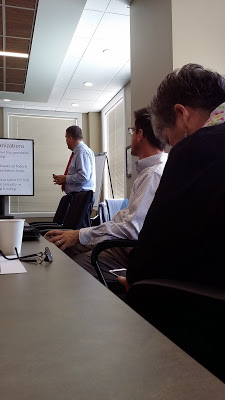 We are hosting a series of “roundtable” discussions with members of the community, in advance of updating our long-range transportation plan, Horizon 2040. Yesterday we met with representatives of local social service agencies; people who work with folks who are disabled, senior citizens, developmentally disabled, and suffering from mental illness.
We are hosting a series of “roundtable” discussions with members of the community, in advance of updating our long-range transportation plan, Horizon 2040. Yesterday we met with representatives of local social service agencies; people who work with folks who are disabled, senior citizens, developmentally disabled, and suffering from mental illness.
We basically asked four questions and opened the floor to a discussion. The questions were:
- What are your thoughts on trends in transportation?
- What do you think is working well with transportation in our region?
- What concerns you about transportation in our region?
- If you could offer the SRTC Board advice before starting an update to Horizon 2040, what would it be?
Here is some of what we heard:
- There are only two slots for wheelchairs on
buses. If those are full, you have to wait for the next bus. With STA’s new
computer system, you should be able to see in real time if those slots are taken
before the bus gets to your stop. - There’s a definite need for an Uber or Lyft drive with a wheelchair-accessible van.
- Disabilities are NOT seasonal. Because of
barriers like snow, some people can use paratransit some months but not
others. - It has to be 85 degrees or hotter for “weather”
riders to be allowed to ride the bus. - There is a limited number of bags allowed on
paratransit, which makes it hard for people to do their shopping for the week
but they don’t have another way to do it. This forces people to shop at places
in their immediate neighborhood, such as mini marts, which can cost more and
not offer healthy choices. Don’t try to buy a watermelon because how are you
going to get that home? - Overlay health care facilities on transportation
maps when planning. - A $45 bus pass consumes a huge part of many clients’ monthly budgets. They are encouraged to get into the community but
transportation poses a big barrier. - Spokane City and other jurisidictions have a
mandate to avoid concentrations of affordable housing. Unfortunately, the best
place to build affordable housing is on
existing transit routes but that exacerbates the concentration issues. - A
mobile farmers market is in the works.
